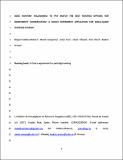Por favor, use este identificador para citar o enlazar a este item:
http://hdl.handle.net/10261/118224COMPARTIR / EXPORTAR:
 SHARE SHARE
 CORE
BASE CORE
BASE
|
|
| Visualizar otros formatos: MARC | Dublin Core | RDF | ORE | MODS | METS | DIDL | DATACITE | |

| Título: | Does hunters' willingness to pay match the best hunting options for biodiversity conservation? A choice experiment application for partridge hunting in Spain |
Autor: | Delibes-Mateos, Miguel CSIC ORCID; Giergiczny, Marek; Caro, Jesús CSIC ORCID; Viñuela, Javier CSIC ORCID; Riera, Pere; Arroyo, Beatriz CSIC ORCID | Palabras clave: | Alectoris rufa Game quality label Hunters’ preferences Questionnaire Sustainable hunting Willingness to pay |
Fecha de publicación: | sep-2014 | Editor: | Elsevier | Citación: | Biological Conservation 177: 36-42 (2014) | Resumen: | In southern Europe, traditional hunting has been frequently replaced by models based on more intensive management. These systems include management strategies like the release of farm-reared animals that can cause harmful effects on biodiversity. However, little is known about the hunters’ views of this activity, and about their preferences for the ecological attributes of the hunting estates. We present the results of a choice experiment exercise evaluating the willingness to pay of Spanish hunters regarding different aspects of walked-up red-legged partridge (Alectoris rufa) shooting, including partridge quality (farm-reared vs. wild) and other attributes related to the ecological characteristics of the estate. We find that, when given the choice, hunting an additional wild partridge in a walked-up shooting day was valued more than 20 times higher than hunting an additional farm-reared bird. The diversity of small game available and the presence of natural vegetation in the landscape in which the walked-up hunting takes place were also significantly valued. Hunters also attributed economic value (albeit lower than other attributes) to the presence of protected non-game fauna in the estate. Overall, our results show that hunters are willing to pay more for hunting on estates that have better ecological characteristics, which may be indicative of good conservation status. This suggests that identifying and promoting such estates could lead to systems that are both ecologically and economically sustainable. | Versión del editor: | https://doi.org/10.1016/j.biocon.2014.06.004 | URI: | http://hdl.handle.net/10261/118224 | DOI: | 10.1016/j.biocon.2014.06.004 | ISSN: | 0006-3207 |
| Aparece en las colecciones: | (IREC) Artículos |
Ficheros en este ítem:
| Fichero | Descripción | Tamaño | Formato | |
|---|---|---|---|---|
| SUPPLEMENTARY MATERIAL.pdf | Supplementary material | 365,33 kB | Adobe PDF |  Visualizar/Abrir |
| DOES HUNTERS’ WILLINGNESS TO PAY MATCH .pdf | Artículo principal | 454,33 kB | Adobe PDF |  Visualizar/Abrir |
CORE Recommender
SCOPUSTM
Citations
32
checked on 16-abr-2024
WEB OF SCIENCETM
Citations
32
checked on 25-feb-2024
Page view(s)
247
checked on 23-abr-2024
Download(s)
624
checked on 23-abr-2024
Google ScholarTM
Check
Altmetric
Altmetric
NOTA: Los ítems de Digital.CSIC están protegidos por copyright, con todos los derechos reservados, a menos que se indique lo contrario.
